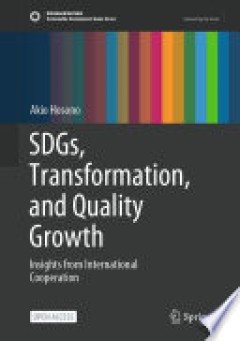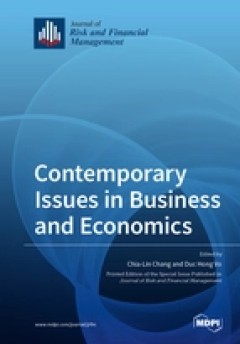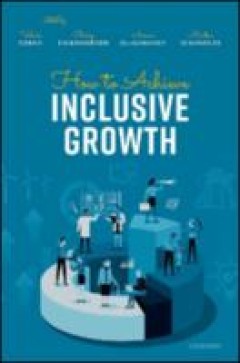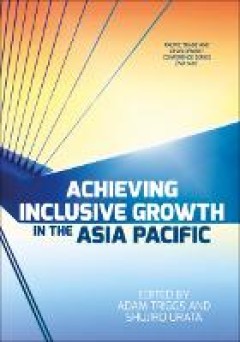Filter by

SDGs, transformation, and quality growth : insights from international cooper…
This is an Open Access book. The primary objective of this book is to seek out insights into the concept of high-quality growth (HQG). It explores the essential attributes of HQG, such as inclusiveness, sustainability, and resilience, as well as its relationship with transformation, by drawing principally on illustrative cases and instances of international cooperation. The United Nations docum…
- Edition
- 1
- ISBN/ISSN
- 9789811697487
- Collation
- xv, 164.; ill.
- Series Title
- Sustainable development goals series
- Call Number
- 338.927 SDG h

The sharing economy in Europe : developments, practices, and contradiction
This open access book considers the development of the sharing and collaborative economy with a European focus, mapping across economic sectors, and country-specific case studies. It looks at the roles the sharing economy plays in sharing and redistribution of goods and services across the population in order to maximise their functionality, monetary exchange, and other aspects important to soc…
- Edition
- 11
- ISBN/ISSN
- 9783030868970
- Collation
- XXXIII, 413p. ; ill.
- Series Title
- -
- Call Number
- 334.094 THE c

Guidebook to carbon neutrality in China
This Open Access publication focuses on China’s goal of achieving peak carbon emissions in 2030 and carbon neutrality by 2060. The book is the first to systematically build a framework combining a top-down and bottom-up analysis of this acute topic. What does carbon neutrality mean for economics in China? Might it imply stagflation or is it an opportunity to maximize the potential of green…
- Edition
- -
- ISBN/ISSN
- 9789811690242
- Collation
- xliv; 335 PG; ill.
- Series Title
- -
- Call Number
- 363.7387 GUI g

Contemporary issues in business and economics
This book is a collection of high-impact papers accepted and presented at the 2019 Vietnam’s Business and Economics Research Conference (VBER2019) organised by Ho Chi Minh City Open University held on 18th–20th July 2019. The Special Issue is associated with a broad coverage of the contemporary issues in Business and Economics in Vietnam and other emerging markets reflecting a key theme of …
- Edition
- -
- ISBN/ISSN
- -
- Collation
- vii, 235p.: ill.
- Series Title
- -
- Call Number
- 330.08 CON c

How to achieve inclusive growth
Rising inequality and widespread poverty, social unrest and polarization, gender and ethnic disparities, declining social mobility, economic fragility, unbalanced growth due to technology and globalization, and existential danger from climate change are urgent global concerns of our day. These issues are intertwined. They therefore require a holistic framework to examine their interplay and bri…
- Edition
- -
- ISBN/ISSN
- 9780192846938
- Collation
- xxiii, 831 p. : bnw, ill.
- Series Title
- -
- Call Number
- 338.927 CER h

Deals and development : the political dynamics of growth episodes
"International financial crises have plagued the world in recent decades, including the Latin American debt crisis of the 1980s, the East Asian crisis of the late twentieth century, and the global financial crisis of 2007-09. One of the basic problems faced during these crises is the lack of adequate preventive mechanisms, as well as insufficient instruments to finance countries in crisis and t…
- Edition
- -
- ISBN/ISSN
- 9780198801641
- Collation
- xxv, 335 p. : bnw, ill.
- Series Title
- -
- Call Number
- 338.90091724 WER d

Achieving Inclusive Growth in the Asia Pacific
The world’s developed economies are experiencing a sharp backlash against globalisation, and it appears to be contagious. Will Asia catch it next? Asia has seen spectacular growth in recent decades. It has benefited substantially from global trade, finance, openness and the rules-based international order. But much of the growth Asia has enjoyed has not been shared. It has not been inclusive …
- Edition
- -
- ISBN/ISSN
- 9781760463816
- Collation
- 287p. ; ill.
- Series Title
- -
- Call Number
- 337.15 ADA a

Industries without smokestacks: industrialization in Africa reconsidered
Structural transformation in Africa has become a hot topic. One of the earliest stylized facts of development economics is that low-income countries have large differences in output per worker across sectors, and movement of workers from low- to high-productivity sectors—structural transformation is a key driver of economic growth. Between 1950 and 2006, about half of the catch-up by developi…
- Edition
- -
- ISBN/ISSN
- 9780198821885
- Collation
- -
- Series Title
- -
- Call Number
- 338.9 IND i

How nations learn: technological learning, industrial policy, and catch-up
Authored by eminent scholars, the volume aims to generate interest and debate among policymakers, practitioners, and researchers on the complexity of learning and catch-up, particularly for twenty-first century late-late developers. The volume explores technological learning at the firm level, policy learning by the state, and the cumulative and multifaceted nature of the learning process, whic…
- Edition
- First edition.
- ISBN/ISSN
- 9780198841760
- Collation
- xxiv, 343p. : ill. ; 24 cm
- Series Title
- -
- Call Number
- 338.927 HOW h
 Computer Science, Information & General Works
Computer Science, Information & General Works  Philosophy & Psychology
Philosophy & Psychology  Religion
Religion  Social Sciences
Social Sciences  Language
Language  Pure Science
Pure Science  Applied Sciences
Applied Sciences  Art & Recreation
Art & Recreation  Literature
Literature  History & Geography
History & Geography